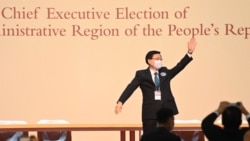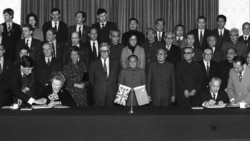On May 30, Hong Kong’s new chief executive, John Lee, was received by Chinese President Xi Jinping in Beijing. Lee had been elected to the city’s top office on May 8, winning 97% of the vote in an unopposed election. He starts the job on July 1.
Lee’s ascension came under Hong Kong’s new electoral system, adopted last May so that only candidates deemed loyal “patriots” to Beijing could participate.
According to the readout about the Xi-Lee meeting published by China’s state-run Xinhua news agency, Xi commended Lee for “his unwavering love for the country and the HKSAR [Hong Kong Special Administrative Region]” and told Lee authorities “have full trust in him.”
Praising the new electoral system’s “decisive role,” Xi said:
“[T]he system is a political and democratic system that is in line with the ‘one country, two systems’ principle and suited to the realities of Hong Kong and its needs for development, which thus must be cherished and upheld for a long time to come.”
That characterization of “one country, two systems” is misleading, however, as Hong Kong has been radically transformed under a series of broken promises by Beijing.
Beijing proposed “one country, two systems” to smooth the transition after Britain handed back the former colony to China in July 1997 under a 50-year timetable.
Under the arrangement, Hong Kong was supposed to have a “high degree of autonomy” in everything other than foreign affairs and defense, allowing the city to preserve its own systems of elections, law, governance, economy and finance.
The promises were formalized by the Sino-British Joint Declaration, signed in 1984, and Beijing’s adoption of the Basic Law, Hong Kong’s quasi-constitutional governing document. In no way did it envision Beijing selecting Hong Kong’s leaders.
Chapter 1, Article 5 of the Basic Law states: “The socialist system [of China] and policies shall not be practiced in the Hong Kong Special Administrative Region, and the previous capitalist system and way of life shall remain unchanged for 50 years.”
The Joint Declaration stated, among other things, that Hong Kong “will be vested with executive, legislative and independent judicial power, including that of final adjudication. The laws currently in force in Hong Kong will remain basically unchanged.”
“The current social and economic systems in Hong Kong will remain unchanged, and so will the life-style,” paragraph 3 of the Joint Declaration says. “Rights and freedoms, including those of the person, of speech, of the press, of assembly, of association, of travel, of movement, of correspondence, of strike, of choice of occupation, of academic research and of religious belief will be ensured by law in the Hong Kong Special Administrative Region…”
China has gradually undermined that “one country, two systems” foundation, especially since Beijing’s drastic clamp down on Hong Kong’s 2019 pro-democracy movement.
Lee’s selection by committee under the revamped electoral system is the latest example.
“He (Lee) got over 99% of the vote, but that's in an election committee with less than 2,000 people that's stacked with Beijing loyalists,” National Public Radio (NPR) reported. “Most of Hong Kong's 7.4 million people had no say in the matter.”
“Lee received 1,416 votes of support and eight votes of no support from a 1,460-member election committee made up largely of politicians and business executives, now even deeper in Beijing’s grip after electoral revisions last year limited candidates to ‘patriots’ deemed loyal to China,” reported The Washington Post. [Editor's note: Only 1,428 valid votes were cast.]
In May 2021, Hong Kong’s legislature passed the election overhaul, which, according to the Associated Press, “drastically reduces the public’s ability to vote and increases the number of pro-Beijing lawmakers making decisions for the city.”
The new law empowered the city’s national security department to do background checks on potential candidates and create a committee to ensure they are “patriotic” to Beijing.
The changes passed with little opposition, AP noted, “as most of the legislators are largely pro-Beijing. Their pro-democracy colleagues resigned en masse last year in protest over the ousting of four lawmakers deemed to be insufficiently loyal to Beijing.”
Lee, formerly Hong Kong’s top security official, oversaw a crackdown on pro-democracy protesters in 2019 and is known for having helped roll out a sweeping national security law, the NSL. It gives authorities wide discretion to criminalize dissent as subversion, secession, terrorism or foreign collusion. The U.K.-based rights group Amnesty International called the law “dangerously vague and broad,” warning “virtually anything could be deemed a threat to ‘national security’ under its provisions.”
Since the NSL took effect in June 2020, more than 180 people have been arrested, and three news organizations have been closed down.
In response to international criticism that China broke its promises of “one country, two systems,” Beijing has called the Joint Declaration a purely historical document that “no longer has any practical significance.”
That, too, is misleading.
“[I]n actuality the Joint Declaration is a treaty filed with the United Nations that has no provision for withdrawal and that China has never repudiated,” William Overholt, a senior research fellow at John F. Kennedy School of Government at Harvard University, wrote in a December 2019 report titled “The Rise and Fall of ‘One Country, Two Systems.’”
Overholt said Beijing’s dismissal of the Joint Declaration “is legally irrelevant” because Hong Kong’s Basic Law contains “virtually the same promises” stipulated in the former.
Regarding freedoms enumerated in the Basic Law, which remains in effect, Overholt wrote:
“There is no way such language can be squared with shutting down book publishers, however embarrassing, or canceling journalists’ work visas. Or, for that matter, denying permits for peaceful demonstrations, as happened many times in 2019.”
Article 22 of the Basic Law says: “No department of the Central People’s Government [i.e., China] and no province, autonomous region, or municipality directly under the Central Government may interfere in the affairs which the Hong Kong Special Administrative Region administers on its own in accordance with this Law.”
However, Beijing declared in April 2020 that its Hong Kong and Macau Affairs Office (HKMAO) and Liaison Office in Hong Kong were not bound by Article 22 of the Basic Law.
The shift “signals the death of the ‘two systems,’” Eric Cheung, a legal scholar at the University of Hong Kong, told The Washington Post. “It is quite clear that they are now bringing the mainland system, the mainland idea of supervision and rule of law, here.”

